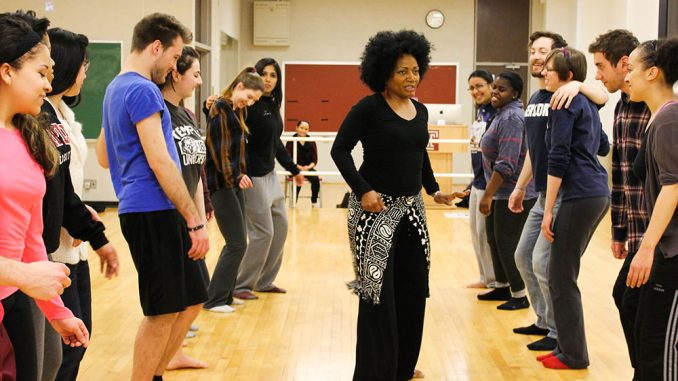
In order to enter an Embodying Pluralism class, students have to take off their shoes.
At 8 a.m. students slowly drift into the classroom, most of them looking groggy and still half asleep. However, students said the relaxed atmosphere is a nice way to wake up. Everyone in the classroom is barefoot, including the professor. The class is held in a dance studio equipped with a wooden floor and a wall-length mirror.
In Embodying Pluralism, students discuss ways dance has impacted various cultures. The course, which satisfies the race and diversity general education requirement, requires students to enact what they learn through movement and dance.
The class incorporates movement as a sort of learning style, like one might incorporate audio or visuals. Though Embodying Pluralism is technically a dance course, the majority of students who take the class are not dance majors, professor Julie Johnson said.
Johnson said the course at
tracts a wide range of majors, most void of any prior professional dance experience, which, is unnecessary, she said,
“The class is unique to every student,” Johnson said. “There’s no universal aesthetic to this class. There’s a lot of creative movement that happens in that class, and creative movement is movement that emerges from ideas and imaginations and experiences of every student.”
Freedom of creative expression is what Johnson said makes Embodying Pluralism appealing. Referencing the title of the course, she said the class is an “embodiment” of ideas circling diversity and race.
“In my experience as a student, a teacher, a dancer, as just a human being, I find that whole body experiencing really ingrains ideas and concepts, but also provides a deeper method of exploration of ideas,” Johnson said.
The class frequently hosts guest speakers who educate students on different types of dance, like salsa or classical Chinese. One guest, Magira Ross, recently attended the class to discuss and demonstrate how African dance has evolved throughout time.
Johnson said guest speakers are an important aspect of the class because they illustrate the important connection between movement and diversity. She said the speakers help to address important lessons in history, such as the Middle Passage, a term used to describe the colonial passage of enslaved Africans to what would later become America.
“[Ross] could have stood there and talked about the Middle Passage, but having us actually stand close together in the middle of the room, close our eyes and sway – we’re listening to her talk, feeling the closeness of the other bodies,” Johnson said. “We are physically moving in such a way that evokes our imaginations, and so it comes a much deeper, fuller, original experience.”
Senior music major Jon Snyder said speakers like Ross are just one reason why he enjoys Embodying Pluralism.
“I like that [Johnson] has brought in guest artists to better explain dance, because I feel like it was something I never really knew much about,” Snyder said. “I feel like by connecting dance to human aspects, I’ve found a new way to appreciate humanity.”
Students in Embodying Pluralism are required to attend dance performances outside of Temple. Johnson allows students to pick the events they attend.
“Philadelphia has such a vibrant dance scene and there’s always something different that’s going on,” Johnson said.
Johnson said it’s important for students to leave Main Campus to attend such performances.
“While the campus offers a lot, there’s a lot to be said about being out,” Johnson said. “It helps to enrich the whole learning process. There are just things that we all encounter that we wouldn’t otherwise if we stuck to our normal routine.”
Snyder said he thinks of Embodying Pluralism as a class that’s far from normal. He said it provides him with a unique opportunity to bond with his classmates.
“We all come together in this strange atmosphere,” Synder said. “I feel like we’ve all come away feeling that we’ve grown closer as classmates because we’ve spent so much time being open and watching each other.”
Snyder, who said he originally enrolled in Embodying Pluralism simply because it fit his schedule, said the class has a number of surprising benefits.
“I never thought this course would have such a positive impact on my life,” Snyder said. “Even though it’s 8 a.m. Mondays and Wednesdays [and Fridays], I really look forward to being there because it’s so engaging. Plus, I get a little bit of a workout.”
Claire Sasko can be reached at claire.sasko@temple.edu.


Be the first to comment